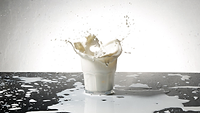FDA Begins Testing Assignment for HPAI H5N1 in Aged Raw Cow Milk Cheese

Image credit: azerbaijan_stockers via Freepik
The U.S. Food and Drug Administration (FDA) recently began a national sampling and testing assignment for Highly Pathogenic Avian Influenza H5N1 (HPAI H5N1) in raw cow’s milk cheese. The objectives of the assignment are to determine the presence of the virus in the cheese, and to take follow-up actions as required to address contaminated product and protect consumers.
The testing project is part of FDA’s greater dairy food safety research agenda for HPAI H5N1.
Raw milk cheese is being targeted due to it containing unpasteurized milk. Although pasteurized milk is considered to be safe, as studies have shown the efficacy of pasteurization in inactivating HPAI H5N1, FDA cautions the public against consuming raw dairy products.
For the project, FDA will collect samples from warehouses and distribution hubs nationwide, and subject the samples to polymerase chain reaction (PCR) testing. Samples that test positive for HPAI H5N1 will undergo viability testing, using an egg inoculation method developed by the U.S. Department of Agriculture (USDA). The assignment is expected to be completed by the end of March 2025, and the agency will publish results after completion.
If FDA detects viable virus in a sample, the agency will take follow-up actions, determined on a case-by-case basis, to protect consumers.
Update, March 14, 2025: FDA has shared interim results from its sampling assignment.
Looking for a reprint of this article?
From high-res PDFs to custom plaques, order your copy today!






